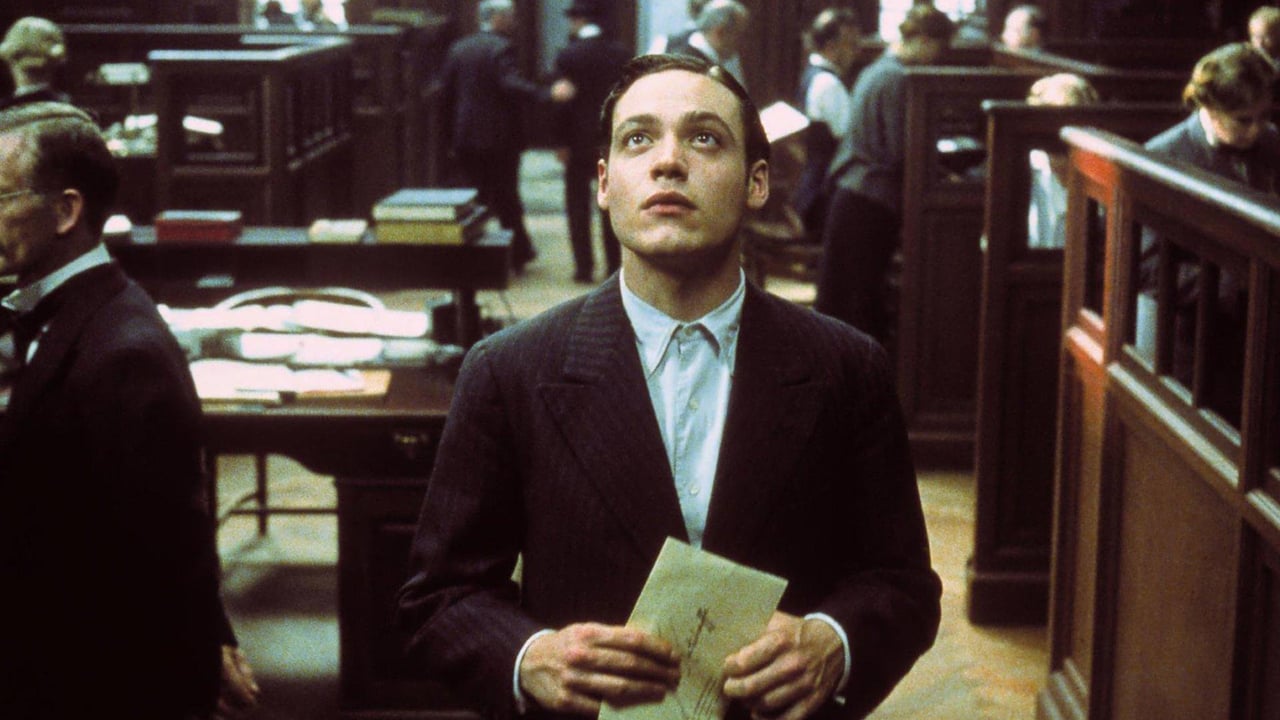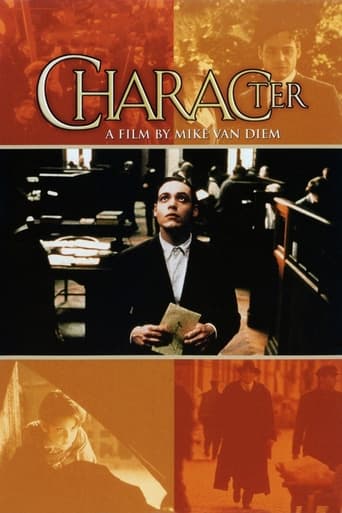



I love this movie so much
just watch it!
Better Late Then Never
I gave this film a 9 out of 10, because it was exactly what I expected it to be.
View MoreA key feature of cinema is that it can show us a part of history that contradicts our stereotypes - positive or negative - about a place or people. Mike van Diem's "Character" is one such movie. We think of the Netherlands as one of the most pristine and wholesome countries in the world. Well it appears that this was not always the case.This adaptation of Ferdinand Bordewijk's novel focuses on Jacob, a man who has had to struggle all his life to get by. The son of a bailiff's housekeeper, Jacob (the product of an apparent rape) spends his life getting bullied every step of the way, while the bailiff refuses to acknowledge him. Indeed, the bailiff makes Jacob's life miserable every step of the way. There are also scenes showing the police raiding workers' rallies (admit it: you thought that sort of thing never happened in the Netherlands).At once a study of an individual's travails and also a look at damaged relationships (as well as the unseemly side of Dutch history), van Diem's movie is an outstanding piece of work. With complex characters and true-to-life gritty settings, it's a movie that you have to see. It definitely deserved its Oscar win. I wholly recommend it.
View MoreThe film starts on the waterways of the Netherlands. Jacob Katadreuffe is a young man born to a single mother. His mother had a brief stay as a housekeeper at the home of a disreputable local official. She became pregnant with his child and left him, whether rape or not is unclear. She raises her child, Jacob, alone. He has a hard time growing up as a bastard child, even being swindled at one point when trying to buy a cigar shop. This endeavor gets him into serious debt, that and his attempts to get himself a law degree, bring him into contact with his estranged father, Dreverhaven. Despite his father's conniving attempts to prevent the young Jacob from doing well, Jacob is able to get his degree. His success and previous altercations lead him into physical conflict with Dreverhaven. He's under suspicion for the murder of Dreverhaven, but it's never clear if he actually did it to me. In any event he's found not guilty and ultimately inherits his father's fortune.It's amazing to get a fresh view of Europe. So much of modern cinema focuses on WW2 or the Cold War, that we're led to forget that there are other stories to tell. I like this take on capitalism and ethics without going so far as to bring in the Soviet influence. There was a lot of controversy all through Europe at the time that focused as much on urban life as ideology.The interaction of the youth in school is also very good. The clothing, the muddy streets, and the fighting amongst the kids paints a vivid, if not realistic image, of life at the time. I particularly liked the school yard fight.I wasn't crazy about the narrative; it seemed like his interrogator would have had less patience otherwise it would be 10/10.I'd recommend this to anyone, but especially if you liked "Angela's Ashes".
View MoreThis is a movie that grips right away. While it has a dark setting, sparse but classic, the characters are rich. The love and care that Mike van Diem and the actors put in this film is visible. Thanks to significant contributions from both Dutch and Belgian TV stations, this movie is a rare treat, which is for once not spoiled by overly commercial requirements from demanding advertisers... As i understand, the film company First Floor Features had this film for decade(s?) in the planning, and it is a happy coincidence that it was realized the way you can enjoy it now. It has thus become a monument honoring the fabulous writer F. Bordewijk, the Dutch life and mind of the beginning 1900's, the craftsmanship of a dedicated cast, and a generous producer. Jan Declair as the stony-hearted usher Dreverhaven is a character you won't forget for a long time. His softer side is time and again rejected by taciturn Joba, his former housekeeper who became pregnant in one lonely weak moment of them both. For several years, he offers her to marry her, or at least to contribute for the upbringing of his illegitimate son Kattedreuffe. She as many times rejects: 'We do not need anything.' On a precarious occasion, Dreverhaven denounces Jacob Kattadreuffe nevertheless, and from that moment on, father and son have a harsh relation as well. -Masterfully, fate intertwines their lives, as the story unfolds. Real gems are present everywhere, the scenery is breathtakingly picturesque, partly filmed in Rotterdam harbor, and in other places like Poland. The movie constantly plays with time, but in a plausible way. As an example, when Kattedreuffe has an appointment at a bailiff's office after being framed into bankruptcy, the name plate blinks at once with his own name on it. And indeed, he starts a career in this very office that same day. For a while, the lives of father and son seem only occasionally to coincide, but it is a silence before the storm. Every picture draws to the dramatic end which was glimpsed as the opening scene: Did Kattadreuffe murder Dreverhaven? Many instances shown would allow this conclusion, as the two fatally attract each other to fulfill their inner tragedy. Dreverhaven as this hard and desperate 'keeper of the law' who can not express love, and Kattadreuffe as the one who had to fight his whole life to arrive in a higher position, and then stands empty-handed, his love unreturned through his own stupidity (even his mother sees that Lorna Te George / Tamar van den Dop was an exquisite relation missed). To kill (!) each other would suddenly seem like the best possibility and a liberation in such a dark hour, but the end has a surprise. The last minute smooths all the giant waves, and allows for a satisfying and ingenuous end scene. - Maybe you have to see this movie more than once to uncover the many hidden treasures, i strongly recommend to get it for yourself on DVD. The music of 'Paleis van Boem' enhances perfectly the impressive scenery. It is an artwork that has more than earned the Oscar it has got as best foreign film in 1998, along with several other awards.And i am proud to have been asked to participate with calligraphy and handwritten material, although it is only clearly visible in the last half minute when (my) hand writes the last words of the testament, undersigning with - (see for yourself!).
View MoreWatching this sludgy, portentous tripe was torture. Any relation between these characters and real human beings is purely coincidental. Example: the main character is supposedly in love with a woman who works in the office, though he's been too shy to do anything about it. At the beach with friends, he meets her by chance. She invites him to her cabana, where, shockingly, there's another man, never seen before. She introduces them. Lover boy is so angry he leaves, and then won't speak to her at the office. He never asks about the other man, she never tells him anything, and the other man is never seen again. Later she marries someone else. His mother says, "you let her get away, you're an ass." Best line in the film.The film at least sparked a good discussion afterwards. We came to see that it's a pro-capitalist, or anti-welfare state, allegory. Both the father and the mother, in their ways, torment the son, and in the end we learn it was all done out of love, tough love: to make him tough. Only then can he inherit the money. The father is a monstrously unbending bailiff, charged with defending property rights by repossession and eviction of those deadbeat lower classes. The kid shows grit and ambition by pursuing legal studies and paying off all his debts. One slight softening: he learns, one time, to accept a gift. Otherwise it's straight Ayn Rand: capitalism is tough to keep society tough. Rely on yourself, don't get soft, climb the ladder and pay your debts, and you'll reap your reward.The style is copied from Steven Spielberg. Same kinds of shots, rhythm, shoving the obvious in your face, lack of interest in real character. Standard Hollywood period piece photography: subdued hazy brown-gray-blue. Excuse me, I have to run to the video store to rent an Eric Rohmer.
View More